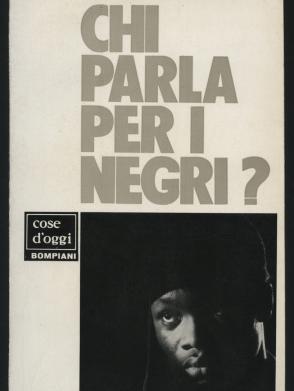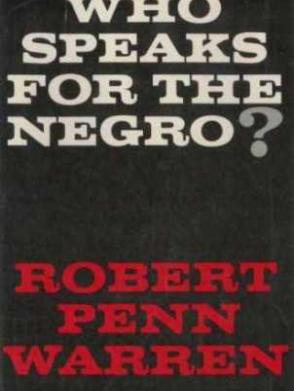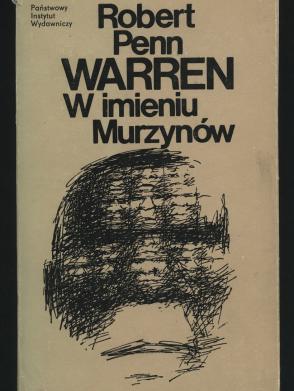Courtesy of Vanderbilt University Special Collections and University Archives.
The Book
In 1965, Random House published Robert Penn Warren’s book titled Who Speaks for the Negro? In preparation for writing the volume, Warren traveled throughout the United States in early 1964 and spoke with large numbers of men and women who were involved in the U.S. Civil Rights Movement. He interviewed nationally-known figures as well as people working in the trenches of the movement whose names might otherwise be lost to history. In each case, he recorded their conversations on a reel-to-reel tape recorder. The published volume contains sections of transcripts from these conversations as well as Warren’s reflections on the individuals he interviewed and his thoughts on the state of the U.S. Civil Rights Movement. The Who Speaks for the Negro? Archive contains digitized versions of the original reel-to-reel recordings, as well as copies of the correspondence, transcripts, and other print materials related to his research for the provocatively-titled book.
Warren states in the forward to the volume: “I have written this book because I wanted to find out something, first hand, about the people, some of them anyway, who are making the Negro Revolution what it is—one of the dramatic events of the American Story. This book is not a history, a sociological analysis, an anthropological study, or a Who’s Who of the Negro Revolution. It is a record of my attempt to find out what I could find out. It is primarily a transcript of conversation, with settings and commentaries.”
Who Speaks for the Negro? was a groundbreaking volume in 1965; the book and its related materials remain a valuable resource for studying the history of race and of the Civil Rights Movement in the United States. Warren had hoped that his book would allow readers the opportunity to “see, hear, and feel as immediately as possible what I saw, heard, and felt.” The digital archive allows users an even greater opportunity to share in Warren’s experiences with the extraordinary men and women whom he interviewed during this turbulent time in United States history.
Expand the red links below to view archival materials related to the creation of the book.
Correspondence contains letters, notes, and other documents through which Warren and his editors set up interviews, checked facts, discussed the writing schedule, and more.
Miscellaneous contains a large variety of documents related to the creation, production, and distribution of various editions of the book. It includes notes, advertisements, printing specifications, and more. Of particular note is a document of recollections about the project written by Warren's daughter, Rosanna Warren.
Reviews contains book reviews of Who Speaks for the Negro which appeared in national, regional, and local publications. The reviews' content varies widely and includes both positive and negative appraisals of the work.
Correspondence
Suzanne Baskin writes Albert Erskine regarding final publication details. She also mentions some personal matters and other business.
Suzanne Baskin sends Warren a Faulkner quotatation. She mentions the schedules of the editorial staff and a memorandum about a change in...
The office of Roy Wilkins acknowledges receipt of the interview transcript. They are reviewing it for errors but will not finish until...
Stokely Carmichael continues his correspondence with Warren. He has read some of Warren's recent work and notes his own views have...
Felton G. Clark acknowledges a date and mentions the tapes.
Ralph Ellison acknowledges receiving tapes and transcripts for review and plans to send corrections soon. He discusses several items...
Notes on Chapter III, format, scheduling and Baldwin
Discussion of sales of book.
Erskine writes to Warren (for whom he uses the familiar name Red) regarding the location of carbon copies of poems and of various copies of ...
Clarifying the date of RPW's return and his availability for a Q&A period
Albert Erskine explains Joe Blotner's delayed visit with Warren. He also mentions the upcoming Vintage edition of Who Speaks for...
Erskine reports on his progress reading chapters. He explains his personal schedule, editing needs, and availability to Warren; he...
Evers acknowledges receipt of interview tape.
Points out an advertising error.
King sends Why We Can't Wait to provide more information about topics related to those discussed in his interview with Warren...
Charles Morgan replies to Nan Talese regarding Birmingham newspaper ownership; she had written previously to clarify information for...
Nancy Mutarelli in the office of James Farmer informs Warren of a clerical mix-up that has delayed scheduling an interview; she suggests times...
No record of Aunt Jemima Pancake House case.
William Stuart Nelson praises Warren for the book and thanks him for his autograph note, "made in friendship."
William Stuart Nelson explains the delay in his response because of the absence of Howard University President Nabrit. He plans an "...
Comments on portrayal of Adam Clayton Powell and Martin Luther King Jr. and the "Conversation Piece" chapter in Who Speaks
Due to James Farmer's travels to Africa, CORE Community Relations Director Marvin Rich clarifies some details for Warren. He discusses...
Tom Rose replies to Warren about a quotation from his work to be included in Who Speaks for the Negro. Rose asks for assistance...
Tom Rose continues correspondence with Warren about a quotation from Rose's work to appear in Who Speaks for the Negro. He...
Notes about tapes of interviews with Clark, Roy Wilkins, and Ralph Ellison
Request for a book to be sent to J.H. Silversmith, Jr., President of the National Jewish Hospital
Warren replies to editorial cuts. He defends the inclusion in the book--and the broader significance--of Powell, Wilkins, Farmer, and...
Warren writes to Frank Dendas regarding the transcription of eight tapes. He also mentions the situations and locations of some other...
Following a letter to Albert Erskine regarding other matters, Warren includes the postscript "The State Department has take WSFN for...
Warren writes to Albert Erskine from France regarding a correction about the place of DuBois's death, in Ghana rather than Nigeria as it was...
In a familiar letter to Albert Erskine in which he describes family life, Warren mentions "some very fine letters" regarding Who...
Mentions reviews and a letter from Niebuhr.
Comments about Warren's son and manuscript chapters
Request for book to be sent to a professor in Hawaii
Warren sends Albert Erskine two potential texts for the epigraph to the book.
Seeking permissions from Adam Clayton Powell regarding excerpts of his biography
Note about transcription of tapes.
Warren asks Tom Rose for permission to quote from his dissertation. A postscript mentions that Warren has found the dissertation "...
Looking for a Faulkner quote from Random House Editor.
Requests permission to quote from Clarence Graham letter originally printed in the Student Voice
Clarifies definition of French verb "affecter."
Initial request for permission to quote from a Marlene Nadle article
Signed permission request allowing quote from a Marlene Nadle article
Priscilla Finness Rushmore, a reader, complains about typographical errors in Who Speaks for the Negro?, which she read...
An angry letter from a reader in California.
Bayard Rustin apologizes for not yet returning a corrected manuscript to Warren due to a mix-up in his office and asks for another copy that he...
Dr. Fredric Solomon writes to enclose a copy of a paper he read at Howard, as Warren had requested. He references research on the...
Thomas Spragens favorably describes the Look Magazine article written in conjunction with Who Speaks for the Negro.
Searching for information about Reverend Joe Carter's voter registration process.
Nan Talese thanks Charles Morgan for sending information about Birmingham newspaper ownership for Warren's book. She explains that...
Nan Talese writes to Charles Morgan to request information about newspaper ownership in Birmingham; she says the information is important for...
Seeking information regarding voter registration of Reverend Joe Carter.
Seeking information about lawsuit related to Aunt Jemima Pancake House.
Seeking information about a lawsuit regarding Aunt Jemima Pancake House.
Nan Talese writes to forward Warren information from Charles Morgan about newspaper ownership and to let him know that galleys will be coming...
Nan Talese discusses SNCC screening policies for voter registration workers and mentions David Halberstram, Bruce Hanson of the National Council...
Letters back and forth regarding questions about southern newspaper ownership.
Mike Thelwell apologizes for misspelling Warren's name in an earlier letter (of 5/14/64). In a postscript he mentions Flood...
Requesting financial support for a community newspaper in Vicksburg, Mississippi.
Roy Wilkins expresses eagerness for the book to be published. He clarifies aspects of NAACP funding. He notes that there has been no...
Whitney Young replies to an Oct. 22 letter from Warren. Young comments on unemployment statistics and expresses thanks for Warren's...
Miscellaneous
Includes quotes from Dolbier, Woodward, Poore, Murray, Maddocks, Coughlin.
A first proof of the revised back cover and a copy of this...
Comments on the spiritual and social nature of demonstrations
Comments on the connection between automation and demonstrations, social unrest, and economics
Discusses racism and responds to Du Bois's concept of split personality
Describes the difference between positive and negative nonviolence and applies this to the demonstrations
Discusses black demonstrations as related to America's image in the rest of the world
This is a draft typescript of the bibliography with manuscript corrections and additions.
Specifications for the printer on how to print the pages of Who Speaks
Additional corrections for the third printing
This is a draft typescript of the index with manuscript corrections and additions.
Sioux City Journal article announcing an award Warren won for Who Speaks
Vanderbilt Magazine article about James Lawson and the Vanderbilt Divinity School.
Materials related to Dr. King's Why We Can't Wait.
Related document:
...
Advertisement for Who Speaks for the Negro. It includes comments from Maurice Dolbier, Charles Poore, Gilbert Highet, and C. Vann...
For the paperback Vintage Books edition of Who Speaks for the Negro? Warren authored a preface commenting on events since the...
Lists additions to the spring book lists and changes in dates of publication (including the date for Who Speaks)
Rosanna Warren provides childhood recollections of Robert Penn Warren's work to write the book, including traveling in secret, receiving...
A first proof, and a typescript marked up with proofreaders' marks, of the back cover for the second printing of Who Speaks for the...
Edits for Chapter II
Handwritten list in two columns of words and phrases related to Who Speaks
Alphabetized list of words and phrases related to Who Speaks
Original Random House cover




